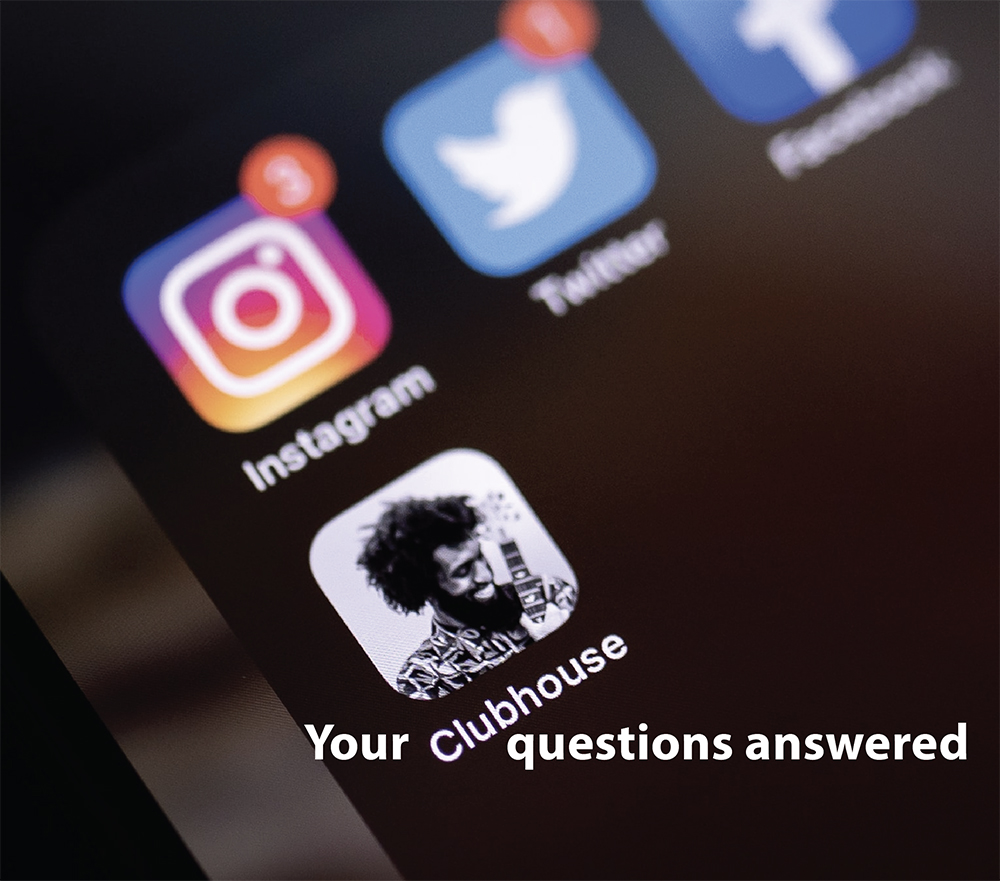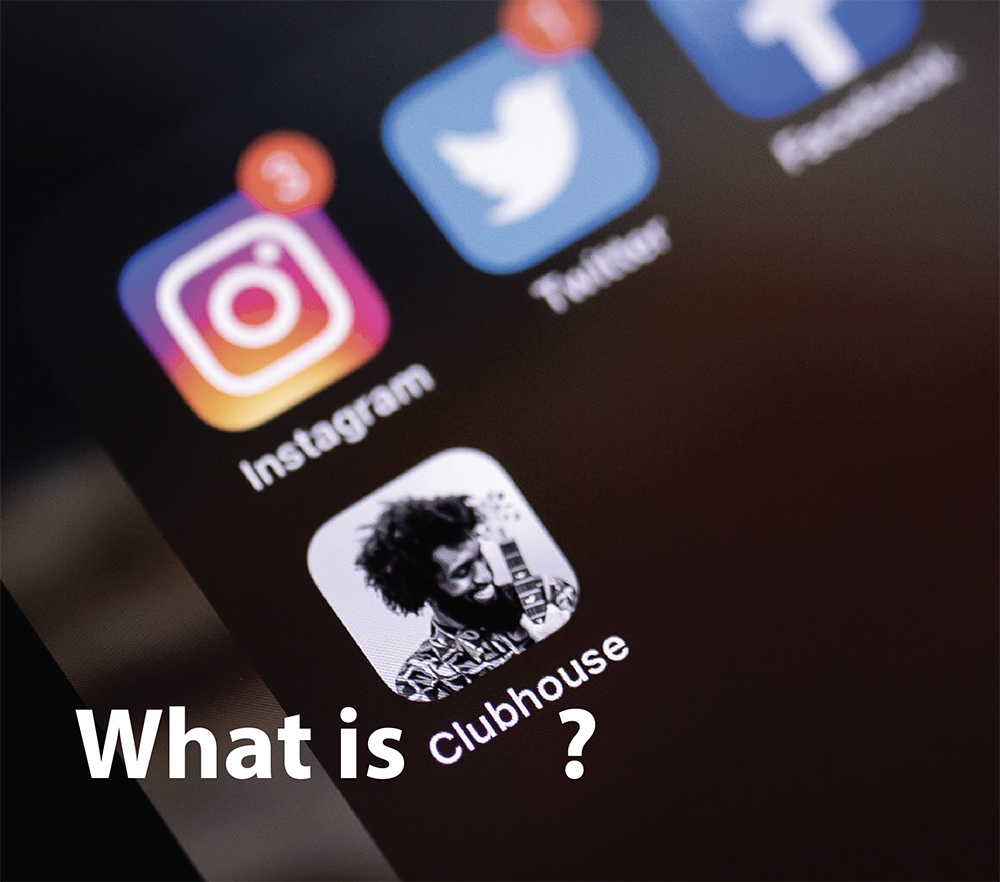If you’ve asked What is Clubhouse? You aren’t alone. With it’s recent popularity, it is a good idea to familiarize yourself with this up and coming social platform.
The Guardian probably describes the social platform best…
Part talkback radio, part conference call, part Houseparty, Clubhouse is a social networking app based on audio-chat. Users can listen in to conversations, interviews and discussions between interesting people on various topics – it is just like tuning in to a podcast but live and with an added layer of exclusivity.
Clubhouse Etiquette
In addition to the formal “rules,” these are things that the creators of Clubhouse encourage participants to be mindful of, regardless of the room they’re in:
• Be respectful. This is pretty self-explanatory — people have set an amazing precedent in the community and we strongly believe in this. Speaking in voice conveys rich context and there’s so much nuance in what you say and how you say it.
• Share the stage. Most rooms have many speakers on stage, rather than just one or two. Having a large group on stage is fun and engaging, but also means it’s important to be considerate of others who are on stage, whether you’re a moderator or just a speaker.
• Be mindful of diversity. The diversity of users, backgrounds, and perspectives makes Clubhouse amazing, and we believe it’s important to keep this in mind — whether you’re organizing an event, deciding who to let on stage, taking turns talking, etc.
• Don’t fanboy / fangirl. When celebrities join rooms in Clubhouse, occasionally people get so excited, they want to put the spotlight on these figures. However, generally the experience for them and others in the room is better when everyone is treated as an equal! Authentic conversations from person to person, irrespective of status, are powerful.
• Welcome the newbies. One of the most amazing things we’ve seen in Clubhouse is the culture of welcoming newcomers. Newbies have a “party hat” badge on their profile photo when they’re in a room so that you know to introduce yourself to them an invite them to come up and speak. You can also join or create welcome rooms to orient and meet newbies!
How to get invited to Clubhouse
• If you know someone already on the platform, request an email invite from them. Or download the app on your iOS device (they are working on an Android version, but as of this post, it hasn’t been released).
Check out the Clubhouse Knowledge center
The clubhouse Knowledge Center online is a great place to get all your Clubhouse questions answered.
Community Guidelines straight from Clubhouse
These were updated January 6, 2021, so contact Clubhouse directly for the most up to date guidelines and more. In January, Clubhouse was in early beta and obviously they are learning and evolving every day. They are open to feedback and suggestions, so reach out to them if you have questions, suggestions, or constructive criticism.
Some of the below Community Guidelines are meant to help you better understand:
• The principles that make Clubhouse a special place
• Primary roles that users play in Clubhouse
• The rules you are expected to abide by as a Clubhouse user
• What you can do if you come across inappropriate behavior
Clubhouse was designed to be a space for authentic conversation and expression—where people can have fun, learn, make meaningful connections, and share rich experiences with others around the world. Below are a few guiding principles that we believe are important.
• Be yourself, respectful, and inclusive. The authenticity of Clubhouse begins with the people. This applies to every person, at all times. And by inclusive – be tolerate, welcoming, and consider diverse people and perspectives.
• Build empathy and understanding. Engage in debates that are in good faith.
• Foster meaningful and genuine connections. This is what Clubhouse is all about.
Please note that these principles are intended to be high-level guidelines only. If you’re interested in knowing what can get people kicked off Clubhouse, check out the Rules sections below.
Conversations in Clubhouse take place in rooms. Within each room, you can be a moderator, a speaker, or a listener. Below are some of the best practices for each role.
When you start a room in Clubhouse, you are the moderator. This means you are a speaker with the special power to add or remove other speakers. As a moderator, you guide the conversation and have a strong influence on the content and style of conversation in the room.
In Clubhouse, the best moderators tend to:
• Thoughtfully curate the speaker group: Great moderators are thoughtful about who they invite to speak, and try to include diverse people, personalities, and perspectives. A moderator can decide to run a “party room” with a lot of speakers, or a fireside chat with just a couple. All types of rooms can work, and it’s up to each moderator to develop their own style.
• Actively manage the conversation: Some speakers are comfortable talking at length, while others are more reserved. Moderators can be a positive, balancing force, asking the quieter speakers to share their perspectives and posing questions to the group.
• Consider the audience experience: Listeners enjoy joining the stage to ask questions, participate in the discussion, or even offer feedback in real-time. Take their questions when appropriate, or feel free to focus on the current speakers—it’s totally up to you. When you do take questions, it’s okay to return a listener to the audience after the question is answered.
Speakers are the people in a room who have the ability to talk. By default, the person who starts the room is a speaker, and so is the first person to join them on stage. Everyone else joins in the audience as a listener, and must be invited up if they wish to speak.
Successful speakers tend to:
• Share the stage: Few conversations in Clubhouse look like a one-on-one interview. Most begin with one speaker and expand to three, five, or, even dozens of speakers. “Sharing the stage” and taking turns speaking expands the breadth and depth of conversation and brings in diverse voices.
• Know when to mute (and unmute): When you’re not actively speaking it’s generally good to tap the mute button in the lower right to minimize background noise. But strategically unmuting is just as important! This means going off mute for a few seconds to laugh, acknowledge what the speaker said, signal that you want to speak next, or just be more present in “hangout” style conversations.
• Bow out anytime: Feel free to leave the speaker section anytime without feeling judged, either by going back to the audience or exiting the room using the “Leave quietly” button.
When you tap to join an existing conversation, you enter in the audience on mute. This means you are a listener!
As a listener on Clubhouse, you should relax and enjoy the conversation.
In other words:
• Don’t feel pressure to speak: Feel free to remain a listener even if you’re invited to speak; there is no obligation to accept.
• Raise your hand to chime in: If you want to join the conversation, just raise your hand by tapping the button in the lower right to let the moderator know that you’d like to be added as a speaker. If they don’t accept right away, don’t be offended. They may get lots of requests and can’t always get to all of them.
• Discover new people: While you’re listening, tap around and learn more about the people in the room. It’s a good way to find new people to follow.
• Feel free to browse other rooms: While present in a room, feel free to explore the list of other active rooms to see what strikes you as interesting.
• Enjoy multitasking. Don’t worry about splitting your attention between Clubhouse and work, hobbies, chores, or an evening walk. People are often doing other things while they Clubhouse!
• Pull your friends aside to chat: See a friend in the audience you want to catch up with? Tap on their profile and ask them to start a new room together.
• Come and go at will: On Clubhouse, 👻 ghosting isn’t a bad thing! You can drop in and out of rooms as you please without worrying about offending anyone. You won’t set off any alerts when you go.
When you use Clubhouse, you agree to abide by the following rules at all times.
You also agree not to encourage others to violate these rules.
The latter is taken seriously and can also result in removal from the Service.
- You must use a real name and identity on the service and be at least 18 years of age to use Clubhouse (or older if required by your country).
- Do not engage in abuse, bullying, or harassment of any person or groups of people.
- You may not discriminate against, engage in hateful conduct directed at, or threaten violence or harm against any person or groups of people.
- Do not share, threaten to share, or incentivize the sharing of other people’s private information without their prior permission.
- You may not transcribe, record, or otherwise reproduce and/or share information obtained in Clubhouse without prior permission.
- Do not engage in any conversations or upload any content that violates any intellectual property or other proprietary rights.
- You may not spread false information or spam, or artificially amplify or suppress information.
- Do not share or promote information (or synthetic or manipulated media) that is intended or likely to cause harm to any person or groups of people, including minors.
- You may not use the service for the purpose of conducting any unauthorized or illegal activities.
If you witness a Rules violation, please follow the instructions below to report it.
And, if you have questions, feedback, or suggestions, please
let us know!
If someone has not violated any of the Rules, but you would still prefer not to interact with them, here are some tools you can utilize.
Room moderators decide who is in a room and can speak:
• Accept or reject speakers: If you are a room moderator you decide who can speak. And if you’d like to invite someone from the audience to speak, just tap on the profile photo of that user and select “Invite to Speak.” If someone else requests to speak, you have the option to decline.
• Mute or remove speakers: Rooms moderators can also temporarily mute a speaker or move them back to the audience. To mute the speaker, tap on their profile photo to open the half-sheet, and then tap the mute button to the right of their profile photo. If you wan to move them down to the audience, tap on their profile photo to open the half-sheet, then tap “‘Move to Audience.”
• Remove from room: If someone is being disruptive or distressing to people in the room, moderators can remove them, and they will no longer see or be able to re-enter the room. To remove them from room, tap on their profile half-sheet, tap the ellipses and remove.
Anyone can decide who they interact with:
• Unfollow: You can unfollow a user at any time. To do so, navigate to the user’s profile and tap on the button that says “Following” to unselect it. They won’t be notified, and you won’t receive any further notifications about their activity.
• Block: You can block a user at any time. On their profile, click on the 3 vertical dots in the top right, and select “Block.”
– Blocked users will not be able to see or join any room that you create or in which you are a moderator or speaker.
– If a blocked user is speaking in a room that would otherwise be visible to you, that room will be hidden from your feed by default, but there will be a capsule at the bottom of your feed to let you know that the hidden room exists. If you would like to see the room regardless, you can choose to tap that capsule and reveal the room.
– If you are just an audience member in the room and a blocked user enters the audience, you will not be proactively notified.
• Shared block lists: If there is someone who many people in your network have blocked, there will be a “!” icon on that person’s user profile to make you aware. This is personalized to you, and is intended to help you make decisions about when to follow someone or bring them up on stage.
We depend on the vigilance of each user and the community to report violations of Rules. If you believe a user has violated a Rule, you can report a Trust & Safety incident. Note: Inappropriate use of the incident reporting system or intentional, false reports are against our rules and are taken seriously.
Temporary audio recording: Solely for the purpose of supporting incident investigations, we temporarily record the audio in a room while the room is live. If a user reports a Trust and Safety violation while the room is active, we retain the audio for the purposes of investigating the incident, and then delete it when the investigation is complete. If no incident is reported in a room, we delete the temporary audio recording when the room ends. Audio from (i) muted speakers and (ii) audience members is never captured, and all temporary audio recordings are encrypted.
You can report an incident in 2 ways:
• Report an incident in real time: From inside a room, tap on the user you want to report. A profile “half-sheet” will pop up; tap the three horizontal dots at the top right, then tap “Report an incident.” Submitting a report from inside the room prompts us to retain the temporary, encrypted audio recording for the purpose of investigating the incident, as noted above.
• Report a past incident: To report an incident after the room has ended, you can go to your user profile, tap the gear icon at the top right and tap “Report an incident.” Note that when you report an incident from your profile, we will not have access to the room’s audio to support the investigation.
Here’s what you should know about reporting another user for a Rule violation:
• If you submit a report, we will not share your identity with the person you are reported.
• All reports that are submitted will be reviewed and investigated. The need for and type of corrective or disciplinary action needed will be determined on a case by case basis.
• We seek to be fair, consistent, and responsive in addressing all reported incidents.
• If the violation directly targeted you, we will share certain information about the process and resolution with you (e.g., the stage
of investigation, any concerns that you may be at risk for immediate harm, information on how the resolution could impact you).
• Intentional, false reports of violations are treated as a violation of the Rules.
If another user has reported you for violating a Rule, here’s what you should know:
• If a report has been filed against you, we will contact you through your Clubhouse account with information about the nature of the report. We may keep some details private in order to protect the reporting user(s). If we are unable to reach you, we may restrict your account access temporarily until we are able to do so.
• We will notify you of the result of the investigation and its potential impact to you.
• If you believe a report has been falsely filed against you or you would like to appeal a decision, please contact us, including as much context as possible.
• Any attempt to retaliate against users who participate in reporting or investigation is a violation.
These are examples of potential consequences for Rules violations (non-exhaustive):
• Provide a warning for a first offense of low severity and impact
• Request the removal of or directly remove offending content
• Restrict the ability to participate in some or all conversations
• Temporarily or permanently disable or remove the account
• Notify law enforcement when there is risk of physical harm or a threat to public safety
Consequences for confirmed violations may vary based on the type and severity of the violation, the impact to victim(s), the historical actions of the offending user, and the intent of the actions.
Finally, please keep in mind this quick legal note on our Community Guidelines, violations, and how we may enforce them:
• You are solely responsible for your interactions with other Clubhouse users and you agree that we will have no liability or responsibility with respect to those interactions.
• We understand that not all Clubhouse users will share our views as to what constitutes a violation of these Community Guidelines. However, to operate a functional platform, we must reserve the right to determine in our sole discretion what constitutes a violation.
• Our failure to enforce these Community Guidelines in each and every instance in which it might have application does not amount to a waiver of our rights under our
Terms of Service or these Community Guidelines.
• We reserve the right, in our sole discretion, to change portions of these Community Guidelines at any time. If we do this, we will post the changes on this page and will indicate at the top of this page the date these terms were last updated.
Clubhouse takes Community Guidelines seriously and ask that you follow them in the spirit in which they are intended. They further recognize that these guidelines must continually evolve, so please do contact them with questions, suggestions, or comments
here. Team Clubhouse thanks you for helping build an amazing community! See/hear you there!




